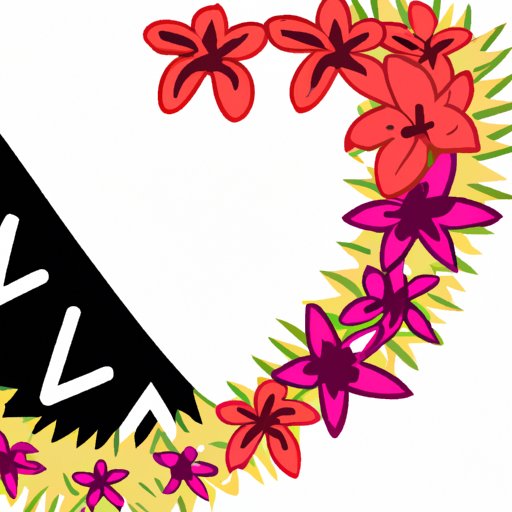Introduction
Cultural appropriation is defined as the adoption or use of elements of one culture by members of another culture. It typically involves a dominant group taking elements from a minority culture without permission or acknowledgment of its source. In recent years, cultural appropriation has become increasingly prevalent in the fashion industry, particularly with regards to Hawaiian culture. This article will explore the implications of dressing in Hawaiian-inspired apparel and the impact this has on local communities.
Overview of Hawaiian Culture
Hawaii is an archipelago of islands located in the Pacific Ocean. The islands are home to a vibrant culture that is deeply rooted in tradition and respect for nature. The Hawaiian people have their own language, music, dance, and art, which reflect their unique history and identity. Hawaiian culture also includes a variety of traditional clothing styles, including colorful floral prints and bright colors.

How the Appropriation of Hawaiian Culture in Fashion is Impacting Local Communities
History of Cultural Appropriation in Hawaii
The appropriation of Hawaiian culture in fashion is not a new phenomenon. In the 19th century, Westerners began to adopt certain aspects of Hawaiian culture, such as hula dancing and ukulele playing, and incorporated them into their own entertainment. This appropriation was often done without any acknowledgement of its source or recognition of the cultural significance of these practices.
In more recent years, Hawaiian-inspired fashion has become increasingly popular. Big-name designers such as Gucci and Louis Vuitton have featured Hawaiian-inspired clothing and accessories in their collections. This trend has caused a surge in demand for Hawaiian-inspired apparel, with many major retailers now offering items such as aloha shirts and leis.
Economic and Social Impacts of Cultural Appropriation
The appropriation of Hawaiian culture in fashion has had both economic and social impacts on local communities. On the economic side, it has resulted in an influx of money into the Hawaiian economy as tourists flock to the islands to buy up souvenirs and other items related to Hawaiian culture. However, this influx of money has been largely concentrated in the tourism sector, meaning that local communities have not seen a proportional benefit.
On the social side, the appropriation of Hawaiian culture has led to a loss of respect for traditional practices and beliefs. It has also contributed to negative perceptions of Native Hawaiians, who are often portrayed as exotic or primitive in mainstream media. Furthermore, there is a concern that the disrespectful use of sacred symbols, such as the Hawaiian flag, could lead to a further devaluation of Hawaiian culture.
Exploring the Controversy Around Wearing Hawaiian Clothing and Accessories
Examining the Power Dynamics of Dressing in Hawaiian Clothing
When it comes to the controversy around wearing Hawaiian clothing and accessories, it’s important to consider the power dynamics at play. By wearing Hawaiian-inspired apparel, non-Hawaiian individuals are essentially appropriating a culture that is not their own. This can be seen as an act of cultural imperialism, where individuals from the dominant group take elements from a minority culture without permission or acknowledgment of its source.
Furthermore, the commodification of Hawaiian culture in fashion can be viewed as a form of exploitation, as it allows non-Hawaiian individuals to profit off the culture without giving anything back to the local community. As such, it is important to consider the implications of wearing Hawaiian-inspired apparel and whether it is an appropriate expression of appreciation or an act of cultural appropriation.
Analyzing the Ethical Considerations of Wearing Hawaiian-Inspired Apparel
When it comes to the ethical considerations of wearing Hawaiian-inspired apparel, there are a few key points to bear in mind. First, it is important to recognize the historical context of cultural appropriation and the power dynamics at play. Second, it is important to think about the implications of commodifying a culture, and whether this is respectful or exploitative. Finally, it is important to consider the potential impact on local communities and whether wearing Hawaiian-inspired apparel could lead to a further devaluation of Hawaiian culture.

A Look at How Hawaiian Cultural Appropriation Affects the Islanders
The appropriation of Hawaiian culture in fashion can have a number of negative impacts on local communities. One of the most significant is the loss of respect for traditional practices and beliefs. By commodifying Hawaiian culture, it can be seen as a form of exploitation, which can lead to a devaluation of traditional customs and a lack of recognition for the importance of Hawaiian culture.
Another issue is the negative perceptions of Native Hawaiians that can arise from the commodification of their culture. By portraying Hawaiian culture as exotic or primitive, it can lead to a further marginalization of the Hawaiian people and a lack of respect for their heritage.
Finally, there is the disrespectful use of sacred symbols. Many Hawaiian artifacts and symbols hold deep spiritual significance to the Hawaiian people, and the inappropriate use of these can be seen as a form of desecration. This can lead to a further devaluation of Hawaiian culture and a lack of respect for traditional practices.
Conclusion
In conclusion, the appropriation of Hawaiian culture in fashion can have a number of negative impacts on local communities. It can lead to a loss of respect for traditional practices, negative perceptions of Native Hawaiians, and the disrespectful use of sacred symbols. When considering whether to wear Hawaiian-inspired apparel, it is important to consider the implications of commodifying a culture and the potential impact on local communities. It is also essential to remember to show respect for Hawaiian culture and to acknowledge its source.
(Note: Is this article not meeting your expectations? Do you have knowledge or insights to share? Unlock new opportunities and expand your reach by joining our authors team. Click Registration to join us and share your expertise with our readers.)
